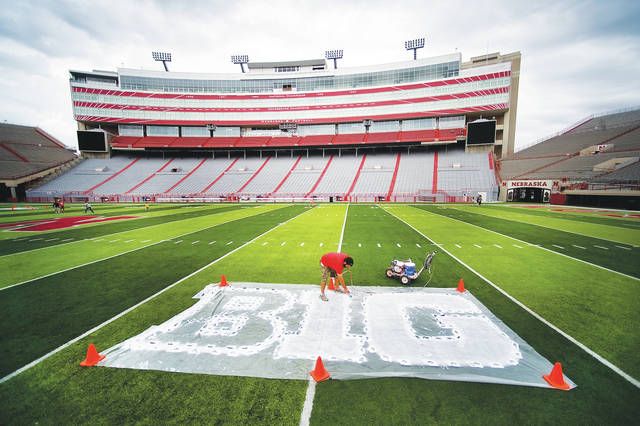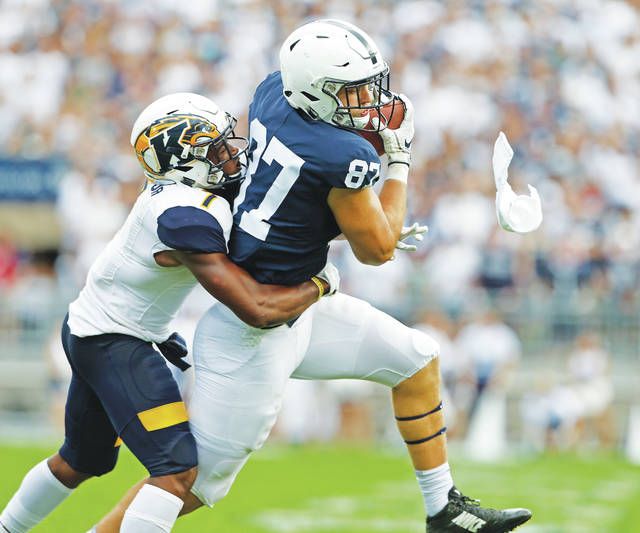
If college football is able to played this fall, Big Ten venues like Nebraska’s Memorial Stadium will only host other Big Ten teams.
Jacob Hannah | AP file photo, Lincoln Journal Star
Click here to subscribe today or Login.
Penn State will not open the season against Kent State. Nor will the Nittany Lions make their long-awaited trip to Blacksburg to face Virginia Tech for the first time. San Jose State will not visit Happy Valley.
In the first major concession toward playing college football during a pandemic, the Big Ten canceled the non-conference schedules of all of its fall sports on Thursday.
“By limiting competition to other Big Ten institutions, the conference will have the greatest flexibility to adjust its own operations throughout the season and make quick decisions in real-time based on the most current evolving medical advice and the fluid nature of the pandemic,” the league said in a statement.
Penn State athletic director Sandy Barbour supported the decision in her own statement.
“This announcement represents a step, a very important step, that will help provide consistency, clarity and some control over the situation,” Barbour said. “We feel in order to establish the safest environment possible for our student-athletes, coaches, staff and our community, this is the best path forward.”
Exactly where that path will lead the Lions — and when — remains uncertain. Penn State was originally set to play nine Big Ten games beginning on Sept. 26 vs. Northwestern. Now, the number of games and their dates are details “that will be released at a later date,” according to the conference.
That’s because it’s still too early for the league to make those decisions. The COVID-19 pandemic continues to hit the country hard, and the Big Ten acknowledged Thursday the possibility that there may be no college games at all.
“We may not have sports in the fall,” new commissioner Kevin Warren told the Big Ten Network. “We may not have a college football season in the Big Ten.
“So we just wanted to make sure that this was the next logical step to always rely on our medical experts to keep our student-athletes at the center of all of our decisions and make sure that they are as healthy as they possibly can be from a mental, a physical, an emotional health and wellness standpoint.”
On Wednesday, Ohio State became the first Big Ten program to halt voluntary on-campus workouts for players because of positive tests for the coronavirus. The university did not release any numbers.
Buckeyes athletic director Gene Smith has publicly been one of the more optimistic voices about playing football as usual this fall, even talking openly about plans to bring in as many fans as the state would allow.
But even he struck a somber tone on Thursday while speaking to Ohio reporters on a teleconference about the possibility of not playing in the fall.
“I am really concerned, that is the question of the day,” Smith said. “I was cautiously optimistic. I’m not even there now.”
Also on Wednesday, the Ivy League became the first Division I conference (FCS for football) to officially cancel sports in the fall while allowing that some, like football, could play in the spring instead if conditions improve.
Barbour said last week that a similar move for the Big Ten would only come as “a last resort.”
For now, the only sure thing is that the Lions will not host Kent State (Sept. 5), travel to Virginia Tech (Sept. 12) or host San Jose State (Sept. 19) as originally scheduled.
The game against the Hokies was easily the most anticipated of the three, especially because the two programs had somehow never played each other before.
“No enter sandman,” defensive tackle Antonio Shelton posted on Twitter with a frown, referring to the Metallica song that famously serves as the Hokies’ intro music.
Particularly disappointed was kicker/punter Jordan Stout, who originally was a walk-on at Virginia Tech before transferring and landing a scholarship at Penn State last year.
“I neeeeeeeed game 2 this year,” Stout wrote on Twitter as the news broke.
It’s far from the only marquee game to be canceled because of Thursday’s news.
Ohio State-Oregon was arguably the biggest non-conference game in the country. Other major matchups included Notre Dame vs. Wisconsin at Lambeau Field, Michigan at Washington and Miami at Michigan State.
Thus far, Penn State has been relatively unaffected by the coronavirus. The only numbers released by the school came on July 1 when Barbour said that 102 players across multiple sports had been tested with zero positives for COVID-19. Players began returning to campus in phases on June 8 and have been participating in voluntary workouts in small, supervised groups since June 15.
The problem for many schools, however, hasn’t been the initial tests when players first return to campus, but the following rounds of testing after they have been interacting with each other. Contact tracing by schools like Kansas State, LSU and Clemson have determined that players were picking up the virus at bars or at parties and then spreading it to teammates.
Ohio State, North Carolina, Kansas State, Houston and Boise State are a few of the FBS programs who have had to pause workouts to ensure the virus did not spread further among players.
None of it bodes particularly well for the prospects of playing football this fall.
“As we continue to focus on how to play this season in a safe and responsible way, based on the best advice of medical experts, we are also prepared not to play in order to ensure the health, safety and wellness of our student-athletes should the circumstances so dictate,” the Big Ten said.
But the league is going to try.
“We remain optimistic about our ability to play sports this fall and in the 2020-21 academic year,” Barbour said. “We have no doubt it will look, feel and act differently than we have become accustomed to over time. But giving our student-athletes the opportunity to compete in the sport they love and have played their entire lives is important to them individually and to us collectively, as well as to the psyche and viability of our community.
“Please have no doubt, it is not more important than health and safety, but it cannot and will not be easily cast aside.”





